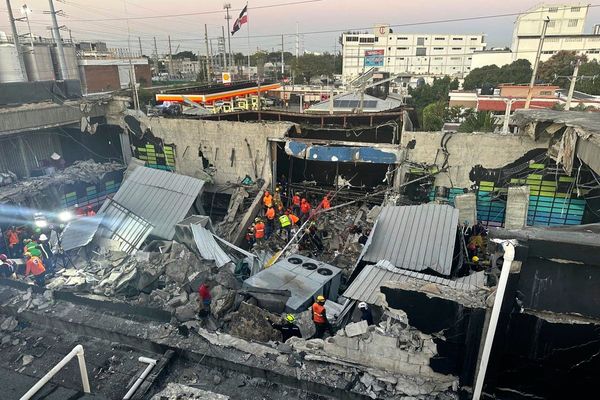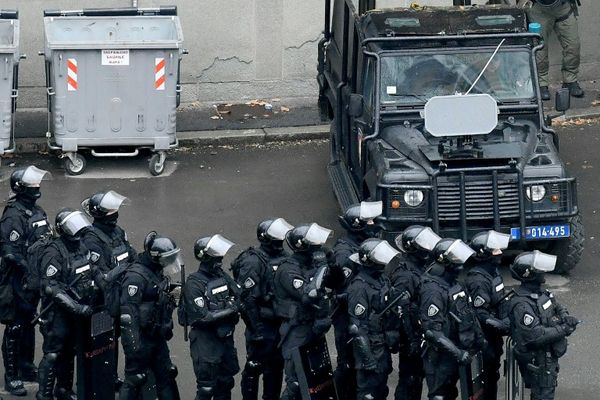Metropolitan Police chief Dame Cressida Dick's bombshell resignation has left a vacuum at the top of Britain's biggest police force.
The scandal-hit Commissioner said she had "no choice" but to quit her post on Thursday after it became clear she had lost the confidence of London Mayor Sadiq Khan.
Her departure came only hours after she told a radio phone-in that she had "absolutely no intention" of quitting.
Dame Cressida was appointed to the top job in 2017 but her tenure was marred by controversies, including the murder of Sarah Everard, the handling of Partygate and the sharing of offensive messages by officers at Charing Cross police station.
Scotland Yard also came under fire when it emerged police officers shared pictures and inappropriate messages about murdered sisters Bibaa Henry, 46, and Nicole Smallman, 27.
Her successor will be under pressure to stamp out deep-seated issues in the culture of the force, while leading the capital's 33,128 officers.

But what will be in the new Commissioner's in-tray once they take up the new role?
Partygate
The Met Police are investigating 12 rule-breaking events in Downing Street and Whitehall during the pandemic, with officers frilling more than 50 people in the coming days.
Boris Johnson is expected to be among those questioned in the high-stakes probe, which includes six events he is believed to have attended.
They include a BYOB do in the Downing Street garden in May 2020 and a gathering in the PM's flat in November 2020.
The police are also reviewing whether to investigate a Christmas quiz at Downing Street in December 2020 after the Mirror published a bombshell new picture of the event.
Top civil servant Sue Gray's report into the row was derailed by Dame Cressida's announcement of a police inquiry on January 25.
Ms Gray was forced to publish a short interim report and push back publication of her findings after the Met demanded references to events it was investigating be stripped out.
There has been criticism of the Met's initial failure to investigate the row and the role of police officers guarding Downing Street when boozy bashes were taking place.
If Mr Johnson is fined by the police for breaking Covid rules then Tory MPs could push for a no confidence vote.
Charing Cross messages scandal
The Independent Office for Police Conduct (IOPC) published a string of racist, violent and misogynist WhatsApp and Facebook messages between officers at Charing Cross police station between 2016 and 2018.
Cops were shown making vile jokes about rape, domestic violence, violent racism, and using homophobic language and derogatory terms for disabled people.
Some 14 officers were investigated as a result, with two found to have a case to answer for gross misconduct. One was sacked and another resigned before he would have been dismissed.
Another two have already left while in some of the other cases the IOPC found "no further action should be taken".
But the messages sparked fresh outrage over the culture within the force, which is already subject to two inquiries.
Baroness Casey is leading a probe organised by the force itself, as well as a Home Office probe headed by Dame Elish Angiolini is looking at the failures behind the rape and murder of Sarah Everard.
Criticism following Sarah Everard's death
The abduction, rape and murder of 33-year-old Sarah Everard at the hands of a serving police officer sparked national outrage.
Wayne Couzens was handed a whole-life term in September for the crime, which triggered widespread recriminations about failings within the police and the treatment of women and girls in society.
The Angiolini inquiry will look at the "systemic failures" that allowed Couzens to be employed as a police officer.
The handling of socially-distanced vigil for Ms Everard last March was widely condemned over the heavy handed treatment of mostly female protesters by officers.

The event was cancelled due to Covid restrictions but hundreds of people turned up to the vigil in Clapham Common, near where Ms Everard went missing in south London.
Police clashed with protesters at the scene, with officers handcuffing women and removing from the crowds.
Misogyny and racism within the force
The culture at Scotland Yard is in the spotlight following the murders of half-sisters Bibaa Henry, 46, and Nicole Smallman, 27.
Their bodies were found in a park in Wembley after they were stabbed to death by Danyal Hussein, 19, at Fryent Country Park.
Sick messages emerged at a misconduct hearing showing PC Deniz Jaffer, 47, and PC Jamie Lewis, 33, shared photos of their dead bodies and referred to them as "dead birds" on Whatsapp.
Mum Mina Smallman accused the Met of racial stereotyping in its handling of the case.
She told the BBC : “If ever we needed an example of how toxic it has become, those police officers felt so safe, so untouchable, that they felt they could take photographs of dead black girls and send them on."

The police watchdog is also investigating whether race played a role in the investigation of Richard Okorogheye's disappearance.
The 19-year-old's body was found in Epping Forest on April 5 2021, after he went missing on March 23.
Teenage knife deaths at a record high
A total of 30 teenage homicides occurred in London last year, passing a previous peak of 29 set in 2008.
Experts believe the rise in teenage killings is due to societal issues, such as a rise in the number of children who are vulnerable, increased pressure on services such as policing, and social media fuelling conflict.
Reports in October said Home Secretary Priti Patel had set Dame Cressida three targets to meet in order to keep her job, which included statistics to show that serious violence and knife crime in London is falling.
Legal action by relatives of Stephen Port's victims
Relatives of the victims of serial killer Stephen Port launched civil claims against the Metropolitan Police in December last year over its bungled investigations into their deaths.
Loved ones of the four gay men accused the Met of homophobia in the way that it handled the investigations into Port, known as the Grindr killer. This has been denied by force chiefs.
Inquest jurors found that "fundamental failures" by the police were likely to have contributed to three of the men's deaths.
Sarah Munro QC, the coroner, published her prevention of future deaths report last month, which said she was "extremely concerned and disappointed by the evidence that I have heard about these series of errors."
Concerns over far-right terror threat
Security minister Damian Hinds suggested in December that the terror threat towards the country may have been made worse by coronavirus lockdowns.
He described how people being holed up in their bedrooms during the restrictions could have pushed them towards radicalisation, which echoed similar warnings from the police and the UN's Counter-Terrorism Committee Executive Directorate (CTED).
A CTED report published earlier that month warned extremists had "sought to exploit pandemic-related sociocultural restrictions that have led people around the world to spend increasing time online, by strengthening their efforts to spread propaganda, recruit, and radicalise via virtual platforms".







